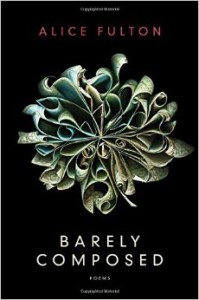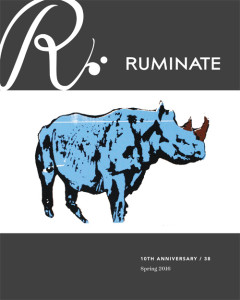 Ruminate Magazine is celebrating 10 years of chewing on life, faith, and art! The 10th anniversary issue features new work from past contributors, drawing together our history and our future as a journal. It hasn’t been easy making it as a print journal, and we couldn’t have come this far without the support of our readers. Check out our 10th anniversary issue here.
Ruminate Magazine is celebrating 10 years of chewing on life, faith, and art! The 10th anniversary issue features new work from past contributors, drawing together our history and our future as a journal. It hasn’t been easy making it as a print journal, and we couldn’t have come this far without the support of our readers. Check out our 10th anniversary issue here.
Keeping Place Whole
A Review of Jamaal May’s HUM (Alice James Books, 2013)
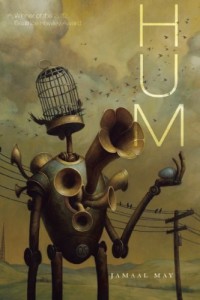 Read my review of Jamaal May’s Hum over at 32 Poems.
Read my review of Jamaal May’s Hum over at 32 Poems.
Excerpt:
The repeated image of the needle invites the reader to investigate how such objects, and the places and people they represent, become patterns that bind together that which frays. This collection asks: What can be salvaged from a city or a person that has been punctured, dragged, forgotten? A needle can mend a wound or open a vein. A needle can also translate the grooves of a record into song; needles can bring “light through drawn blinds” and “wind through a window’s failing”; “old factories needle / into the sky” (“The Hum of Zug Island”).
Poetics of Drought at AWP 2016
AWP attendees! Join us for a panel on poetry and the environment with Matthew Cooperman, Brenda Hillman, Angela Hume, and Rusty Morrison, moderated by Kristin George Bagdanov.
Room 403 B, LA Convention Center, Meeting Room Level
Saturday, April 2, 2016
12:00 pm to 1:15 pm
Info on the AWP program
Lamb Body
Bin Ramke selected my poem “Lamb Body” for the 2015 Academy of American Poets Prize at Colorado State University. You can now view the poem online here.
Resurrection Body
I’m pleased to have my poem “Resurrection Body” forthcoming in the winter 2016 issue of Cincinnati Review. Take a look at their blog to see what I have to say about the poem here. Also hear from Donald Revell, Joshua Coben, and Steven Wineman about their poems in the same issue.
Poetry Has Value
Jessica Piazza from Poetry Has Value interviewed Brianna Van Dyke (editor-in-chief) and me about how and why we pay contributors to Ruminate Magazine. Here’s an excerpt of her introduction:
The intelligent, practical and, well, real way the editors articulate the struggles with and importance of sound business focus in the poetry world was so important for me to read. And I think it’s important for you to read, too. We could all use a little more straight talk and, perhaps, a little less fear that we’re ruining our art when we try to perceive the many ways it’s valuable, including economically.
Read the full interview here and be sure to follow her project to hear about what other magazines are doing to help change the conversation of value and worth in the poetry world.
Teaching and Writing in the Anthropocene
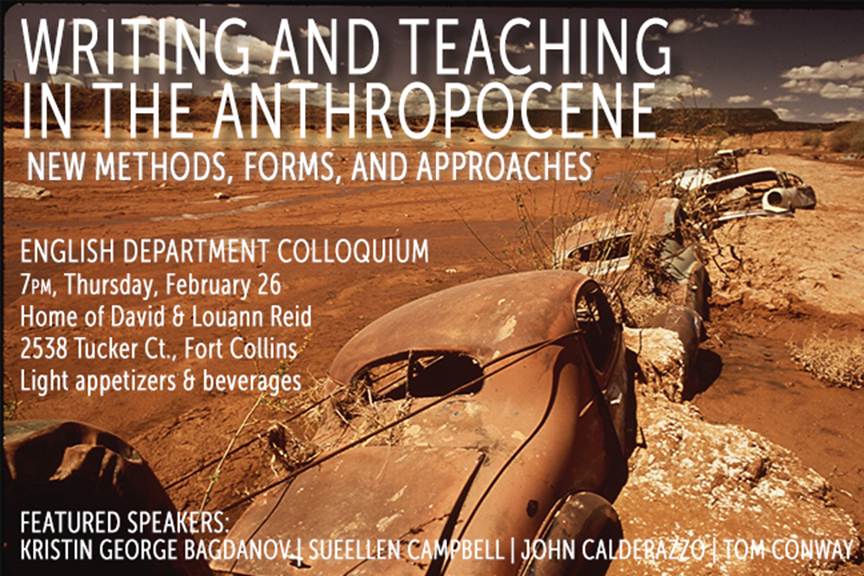 Thanks to those who came out to our spring colloquium. If you’d like to be added to an email list to stay apprised of similar conversations, send me a message here.
Thanks to those who came out to our spring colloquium. If you’d like to be added to an email list to stay apprised of similar conversations, send me a message here.
“Anthropocene”: a word that denotes a new geological epoch precipitated by human impact; a word that reveals what happens when we overexert our agency and fail to understand the world through the perspective of deep time. Everything changes in the context of the Anthropocene; the residue of urgency and crisis is left on our speech, our actions, our writing—even the way we teach.
This discussion will focus on what it means to write and teach in the Anthropocene. What new methodologies, theories, and forms can help us better understand and incorporate the paradigm shift necessitated by theAnthropocene? How is the “ecology” of the classroom informed by the crisis of the Anthropocene?
Interview with MAR
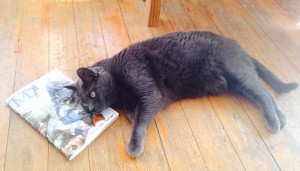 I’m pleased to have a poem in Mid-American Review’s 35 year anniversary issue. Read more about the poem, my cat, sleep, and other concerns in my interview on their blog here.
I’m pleased to have a poem in Mid-American Review’s 35 year anniversary issue. Read more about the poem, my cat, sleep, and other concerns in my interview on their blog here.
Review of Barely Composed by Alice Fulton
My latest review for Colorado Review:
“The title of this collection encapsulates the way these poems combine honest vulnerability with an almost unraveled, or unraveling, sense of urgency for the self and the world—as if in poetry we are only able to barely eek out the poem before the stakes shift and the poem with it, the poet trailing off behind.”
Colorado Review State of the Stats
I really enjoy making infographics, so like last year, I compiled Colorado Review’s 2014 submission statistics and put them into pretty shapes and charts. Can’t believe it’s my last year interning there!
Click here to read about our 1% acceptance rate and our lovely VIDA numbers.

